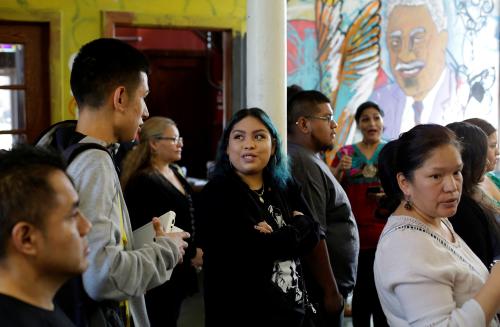A version of this op-ed was originally featured in Real Clear Markets on May 30, 2019.
Comprehensive immigration reform has been an important topic for decades in the U.S. In the post-September 11, 2001 era, there has been increased detainment and deportation of undocumented immigrants. In particular, immigration law enforcement and the collaboration between federal and state or local authorities has increased dramatically in the past two decades. The Trump administration has increased the uncertainty (and suffering) of asylum seekers at the U.S. border over the past two years. The abuses, detainment and deaths of asylum seekers – most disturbingly 6 children at the southern border facilities – is a human rights issue. Much more needs to be done to address these abhorrent conditions which have put families in tent cities and, in some cases, cages due to the backlog in processing of asylum seekers.
The last major piece of immigration-related legislation was the Homeland Security Act which established the new Department of Homeland Security in 2002. This act created three new agencies which now administer existing immigration and immigration law enforcement: Citizenship and Immigration Services (CIS), Customs and Border Protection (CBP) and Immigration and Customs Enforcement (ICE). However, little was done to address the large undocumented population already residing in the US. Deferred Action for Childhood Arrivals (DACA) was established in 2012 to prevent the deportation of children who arrived prior to the age of 16; this was an executive order and not new legislation. The DREAM Act which provided a path to citizenship for children who arrived in the US as minors has failed to be approved by Congress for almost 20 years. As a result, the human costs associated with outdated and poorly considered immigration laws continues to mount.
In effect, abused immigrant women and children have stopped seeking legal permanent residence status (also known as “green cards”) as immigration enforcement activities have intensified.
This increased immigration enforcement has had an impact beyond the mere detention and deportation of immigrants in important ways as identified by new research. Researchers have found that the increasing immigration law enforcement activities have reduced the number of self-petitions for legal permanent residence status under the Violence Against Women Act (VAWA) provision covering battered immigrant spouses and children. In effect, abused immigrant women and children have stopped seeking legal permanent residence status (also known as “green cards”) as immigration enforcement activities have intensified. The study authors, Catalina Amuedo-Dorantes and Esther Arenas-Arroyo, find that the reduction in self-petitioning is driven by fear that the self-petitioners may be deported themselves or have their existing status jeopardized in this new era of increased immigration law enforcement. In effect, victims of domestic violence are fearful of speaking up or seeking relief from their abusers; they are condemned to endure their abuse for fear of deportation or detention under increased immigration enforcement activities in the US.
Using data collected via a Freedom of Information Act (FOIA) request, the authors compiled data on the number of VAWA petitions for legal permanent residence in the US by state and year for the period 2000-2016. They link the VAWA self-petition data to measures of immigration law enforcement activities across time and location. The panel data allows the researchers to investigate the impact of increased immigration enforcement practices on self-petitions for legal permanent residence status by abused immigrant spouses. Their analysis makes a compelling case that the reduction in self-petitions are a direct result of increased immigrant enforcement activities coordinated across federal, state and local law enforcement agencies.
The authors are careful to account for the possibility that the reduction in self-petitions is due to a reduction in overall violence within this particular community over time. In their analysis, they find that domestic homicides are not meaningfully related to increased immigration enforcement activities. This proxy outcome variable suggests that there is no overall reduction in spousal abuse or violence for this immigrant population over time. Instead, the authors make the case that the reduced applications for legal permanent status is driven primarily by fear of deportation or detention. Indeed, changes in official policy reducing the protection from deportation for individuals facing domestic violence, announced in June 2018, can only serve to worsen these outcomes.
This study highlights one of many reasons there is a crucial need for comprehensive immigration reform. While much has been made of the importance of immigration reform on economic and security issues, increasingly there is evidence that there are also real humanitarian problems as well. First, the plight of detained and separated families seeking asylum at the border is abhorrent. Second, as this new research shows, there are additional humanitarian costs for the population of abused and battered immigrant spouses and children. In calculating the human costs of outdated and, often, irrational immigration policies, the authors document a new element to be considered – abused spouses and children.






Commentary
Op-edOutdated immigration laws increase violence toward women
May 30, 2019